Volume 1, No. 12: Three Essential Queer Novels for Pride + Garlic Scape & Ricotta Tart
In which I break all the rules for the first time
Greetings, friends, welcome to June, and happy Pride! I could say a lot about Pride: its radical history, how corporations have co-opted it for their own greedy purposes, what it means to me personally, the ways in which it still feels sacred, how much work we still have to do. I’m not going to get into any of that. I am going to throw my own little Pride party right here in this newsletter. Since I’m an all-queer-all-the-time kind of reader, it’s really just an excuse to tell you about three of my most beloved queer books.
I realized, while writing this, that these three novels have a lot in common. All of them have queer suffering and queer joy in almost equal measure. They all have joyful endings that feel both honest and earned. They’re all about biological families with queer people in different generations — parents, children, and grandparents. So I guess I have a type. I am eternally grateful for the vastness of queer lit. Of course there’s no such thing as an essential queer book. These are simply my essential queer books, the ones I return to over and over again.
Please also enjoy this gift of a poem by Chen Chen. I could not love it more if I tried.
The Books
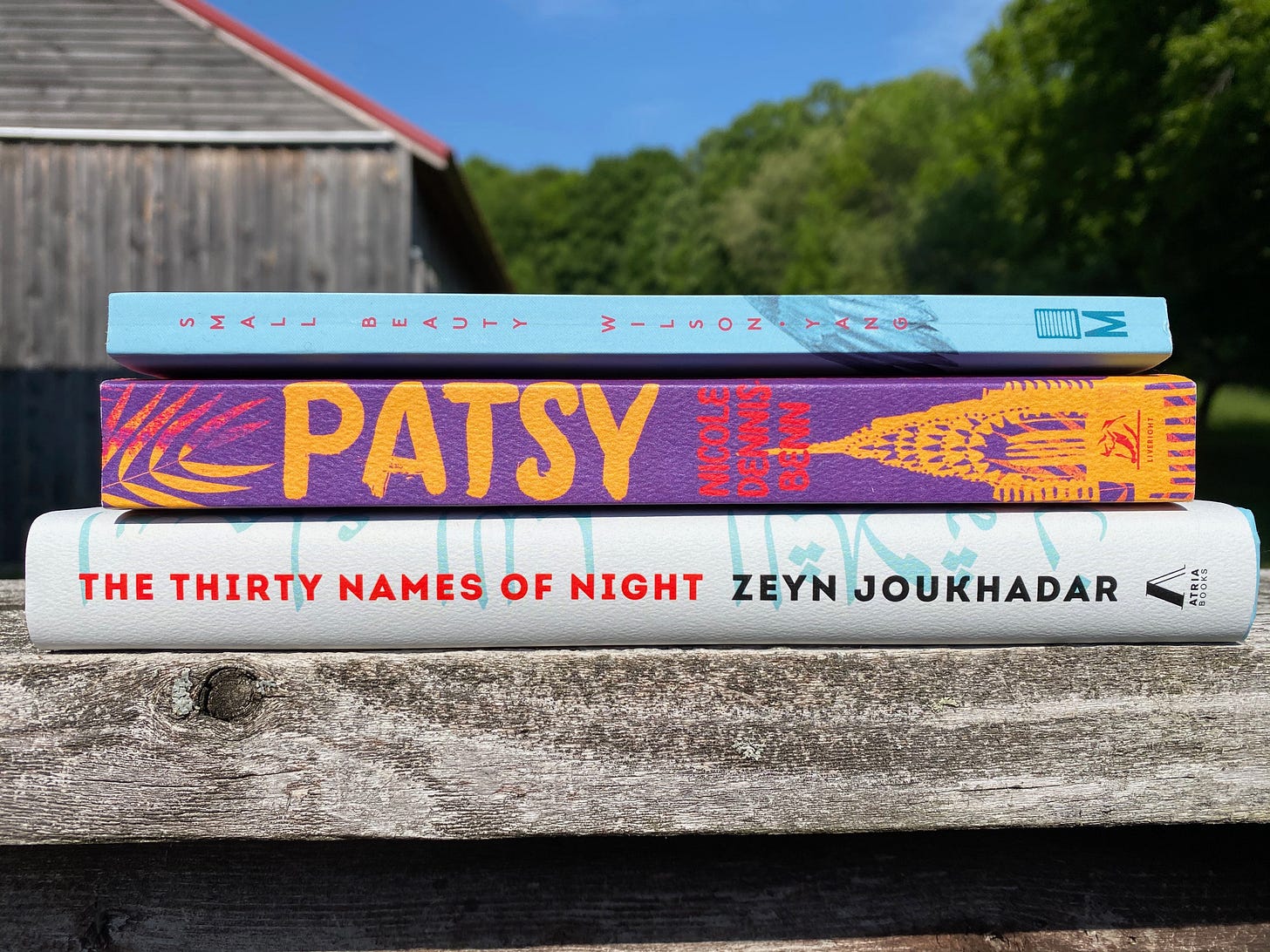
Small Beauty by jia qing wilson-yang (2016)
I heard about this book a while ago, but had trouble finding it at my library. I finally bought it last spring, and I finally got around to reading it a few months ago. It’s one of my favorite reads of the year so far (and ever). It’s a quiet, introspective novel about grief, queer lineage, immigrant families, trans friendship, small towns, the natural world, ghosts.
Mei is a Chinese Canadian trans woman whose cousin has just died. She inherits his house in the small town where they both grew up. She decides to leave her life in the city to go live there, and she spends the next year grieving and remembering. She talks on the phone with her best friend from the city. She cooks, goes on long walks, hangs out with her cousin’s dog, and visits with people from her childhood. There’s not a lot of plot, but there is a lot of story.
The book isn’t linear, but moves fluidly between past and present. It’s such a beautiful way to write about grief, which is so often chaotic and messy. There’s also this gorgeous spaciousness in both the prose and in how the story unfolds. Mei literally steps away from her life to grieve, and to begin to heal the wounds she’s carried since childhood. Of course it’s not a linear process. Witnessing her journey is like watching a friend go through something painful and revelatory in real time. Everything about this book is so true to life: the descriptions of ordinary moments, the dialogue, the way memories are sometimes more vivid than the present.
There are a few short sections told from the POV of other people in Mei’s life. I was so deeply engaged with Mei that at first this surprised me. But wilson-yang knows exactly what’s she’s doing; these perspectives expand the story. So much of this book is about what we know about each other and what we don’t. It’s about the parts of our lives that stay hidden, and the silences families keep in order to survive. It’s a character study and a family saga, interlocked. Every voice is singular.
There are so many more things I could say about this beautiful novel, but I find myself reluctant to say too much. Every now and then, when I come across a story like this, a book that reveals itself so slowly and perfectly, I just want to shove it into everyone’s hands without explanation. I want you to get to peel back all the layers of it yourself.
Patsy by Nicole Dennis-Benn (2019)
I wasn't wild about Dennis-Benn’s first book, Here Comes the Sun. So I didn’t rush to pick up her second novel until my aunt (thanks, Elisabeth!) raved about it. I’m so glad I did because it’s one of my favorite queer books ever.
Patsy is a gay Jamaican woman who immigrates to the US, hoping to reconnect with her childhood friend and first love, Cicely. She leaves her five-year-old daughter Tru behind in Jamaica. Over the next decade, both Patsy and Try wrestle with the consequences of her actions.
In New York, Patsy faces the realities of life as undocumented immigrant and queer Black woman. Cicely is married and their reconciliation doesn’t go as Patsy dreamed. The life she wanted — a life of freedom, far removed from the traumas of her past — isn’t the life she gets. In Jamaica, Tru moves in with her father and his family. She has a difficult relationship with her stepmother, and with most of the adults in her life. She misses her mother. In the midst of trying to figure out her own identity, she slowly realizes that her mother isn’t coming back.
The characters — all of them, but especially Patsy and Tru — are so well-drawn. There is so much going on for both of them. Dennis-Benn writes so precisely and openly about their emotional turmoil, about the things inside them that drive them forward and back, about what haunts them. So many brilliant scenes capture Patsy and Tru in crisis, in love, in anger, in exhaustion and indecision and regret.
Telling the story from both their perspectives makes it messy and dynamic and many-sided. Patsy’s pain is visceral. So is the joy she eventually finds when she falls in love again in New York. We get to see all of her, the soft parts and the angry parts. But we also get to see what she doesn’t: how her choices have impacted her daughter, whom she thinks about but doesn’t interact with. They are deeply entwined with each other, but they live separate lives. It’s a stunning way to tell a story. Because the characters are so vivid, their emotions so real, the whole book feels both intimate and sweeping. I continually had to remind myself I wasn’t reading about real people.
This is not a simple, easy book. It upends normative narratives about queer women, mothers, daughters, and immigrants. It subverts societal expectations about motherhood. Patsy does not do what mothers are supposed to do. She’s not a good mother, a proper mother. She’s also not a monster mother. She’s a woman who did not want a child and chose a different life for herself after she had one. Dennis-Benn writes with so much compassion and curiosity about all of it.
I listened to the audiobook, narrated by Sharon Gordon, and it is a masterpiece. Do yourself a favor and listen to it.
The Thirty Names of Night by Zeyn Joukhadar (2020)
I have honestly been waiting to write about this book since I launched this newsletter. I don’t have the words for how much I love it. There are endless possibilities in this novel, stories upon stories upon stories, whole worlds of queer and trans lives written into existence.
It’s a multigenerational family saga about queer and trans Syrian Americans and Syrian immigrants searching for belonging, home, and community. In contemporary New York, Nadir, a twenty-something trans man, is grieving the loss of his mother while taking care of his grandmother. When he finds the journal of a Syrian bird artist his ornithologist mother loved, Laila Z, he realizes he’s part of a queer family lineage he didn’t even know existed. Laila’s chapters take place in Syria and across the US in the first half of the twentieth century. Joukhadar effortlessly weaves these two stories together into a breathtaking book about hidden trans histories and infinite trans futures.
I could talk about this novel for days, but I won’t. Instead I’m just going to tell you about one amazing thing: the freedom Joukhadar gives their characters. They get to simply exist, with all their contradictions. I can’t overstate the sheer relief of reading a book like this. Queer characters in fiction, especially historical fiction, are so rarely allowed to just be. So many stories about queer characters living in the past are about how hard it was. As if the lives of our queer and trans ancestors revolved exclusively around queerphobia. It's an exhausting and limiting way to think about the complexity of queer experiences throughout history.
Joukhadar doesn’t limit himself to this narrow worldview. He imagines full, complicated, varied lives for queer and trans people across many decades. He doesn't make their lives small by making them only about suffering. He also doesn't erase their suffering. Nadir and Laila and their queer families survive and thrive. They are messy, imperfect humans with lives that are sometimes impossible and sometimes joyful, full of loss and love and misunderstandings, challenges and moments of deep connection.
It is sometimes physically painful to read, especially Nadir’s sections. It’s such a close POV, and it hurts, because Nadir is engaged in the slow and painful process of coming out in a transphobic, racist world. But then there are passages like this:
[A]ll around us, there are brown and Black bodies marked with glow paint and tattoos. There are micro-minis and leather short-shorts and calf-length dresses in pleated faux silk atop unshaven legs. There are bodies with breasts, with thighs, with scars, with canes; wearing high heels, wearing high tops; large bodies, small bodies, bodies that twirl and shake and fill the room. This is not dancing, but a becoming of winged creatures.
I bend and untangle and step out of my body, lightening myself into this swollen room where boys like me are arcing and vaulting our unruly bodies, shaking the wet newness from our wings.
Joukhadar writes joy like few other queer writes I’ve encountered. This novel embodies queer joy, trans joy, a joy that exists outside of whiteness. I felt the same way while reading it as I did while reading Detransition, Baby, and for the same reasons. Queer books like this, that hold so many truths at once, are an astonishing gift.
See also: gorgeous prose, incredible descriptions of birds real and imagined, immigrant history, a vivid sense of place, complicated family dynamics, a little bit of magic (or maybe not), ghosts, an ending so glorious I still get shivers when I think about it.
Have I gushed enough? Not possible! I listened to it (amazing performances by trans actor Sammy Figaredo and Arab American actor Lameece Issaq) and I highly recommend the audio. I also bought it, obviously, because love and rereads.
The Bake
I got my first garlic scapes this past weekend! These delightfully curly delicacies, the stems of garlic flowers, are one of my favorite things about June, and this tart is my favorite way to eat them. You make a simple garlic scape pesto, mix it with ricotta and eggs, and toss it in a pastry shell. You can fancy it up with toppings, but it’s just as delicious without any adornments. I have a reputation for bringing it to June gatherings, and I am not sad about it.
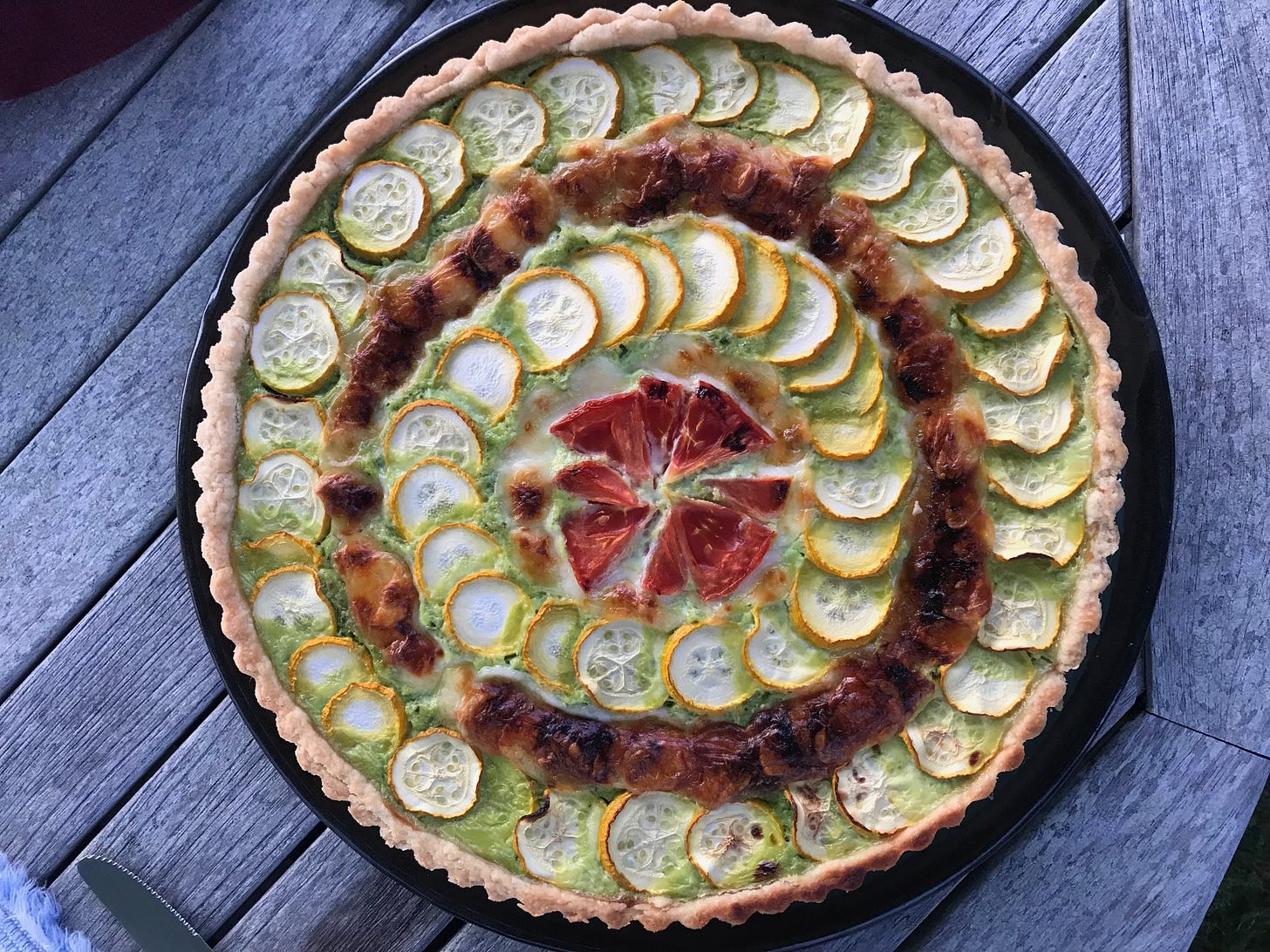
Garlic Scape & Ricotta Tart
Makes one 10” tart
It’s simpler than it looks! Garlic scape pesto + ricotta + flaky pastry = early summer heaven.
Ingredients
For the crust:
2 sticks (16 Tbs/227 grams) cold unsalted butter, cut into small pieces
295 grams (2 cups) all-purpose flour
pinch of salt
2-4 Tbs ice water
For the filling:
2 bunches garlic scapes (12-15 scapes), flower ends removed and roughly chopped
handful of fresh basil leaves
1/4 cup olive oil
1/4 cup pine nuts (almonds or walnuts also work!)
16 ounces ricotta
salt and pepper to taste
2 eggs
handful of sun dried tomatoes and/or one zucchini, thinly sliced (optional)
fresh mozzarella, thinly sliced (optional)
To make the crust: Put some cold water in a bowl with ice and set aside. In a mixing bowl, combine the flour, salt, and butter with your fingertips. To keep the dough from getting too warm, dip your fingers in the ice water every now and then. Mix until it resembles coarse sand (some larger chunks of butter are okay). Add the water a little bit at time, mixing with your fingertips between each addition. When the dough mostly holds together, dump it on the counter and knead it a few times to gather into a ball. Flatten into a disk, wrap with plastic wrap, and stick it in the fridge. (You can also do the mixing in a food processor.)
To make the filling: In a food processor, combine the garlic scapes, basil, and olive oil and puree until smooth. Taste and adjust to your liking by adding more basil, olive oil, or nuts. Add salt and pepper, ricotta, and eggs, and puree just until everything is well blended. Set aside.
To bake the shell: Preheat the oven to 375. Roll out the chilled dough on a lightly floured surface. Use your tart pan as a guide; you’re aiming for a circle a few inches bigger than the pan. Carefully transfer the rolled dough into the pan. Trim the excess from the edges and prick the bottom with a fork. Stick it in the freezer for 15 minutes. Line the chilled shell with parchment paper and pie weights (or dried rice or beans) and bake for 20 minutes. Remove the parchment and weights and let cool.
To assemble: Spread the filling evenly in the cooled shell. If you want, arrange sliced zucchini, mozzarella, and sun-dried tomatoes in concentric circles on top. Bake for about 40 minutes, until filling is set and the crust is golden brown. Serve warm or at room temperature, with your dear ones, celebrating.
The Bowl & The Beat
The Bowl: Two Early Summer Salads to Share
I don’t like crowds, so I’ve never been one to celebrate Pride at parades and big parties. But now that I’m vaccinated, I am looking forward to more little gatherings with people I love. I recently made these two salads for a dear friend’s birthday. The act of making them and bringing them to her house — to share! — felt like a gift to myself. They both celebrate the bright flavors of early summer. They’re quick to make and easily transportable. In other words: perfect for potlucks and picnics.
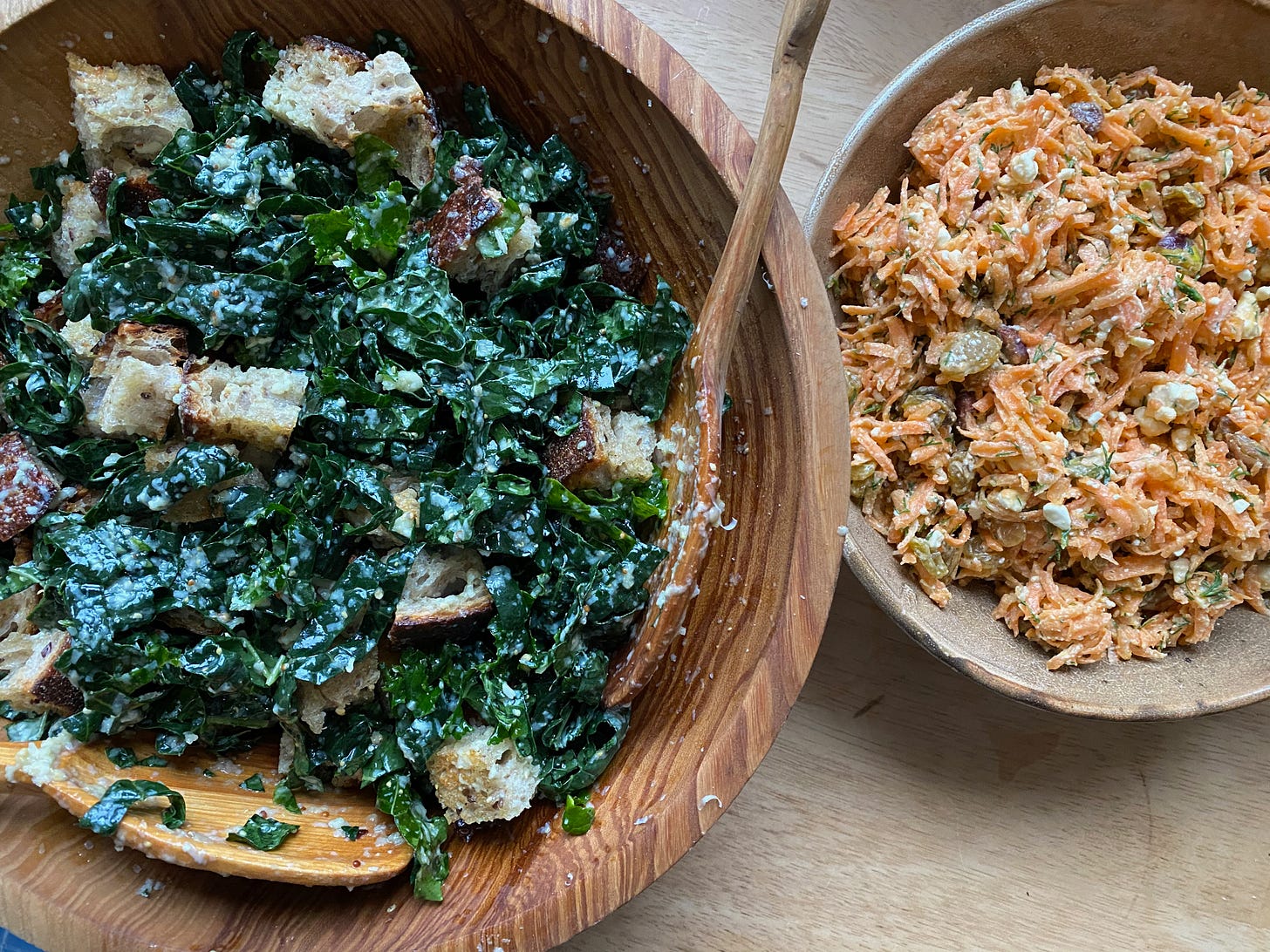
Lemony Kale Salad with Croutons: Destem a bunch of Tuscan kale. Chop it into small ribbons and dump it in a bowl. Cut a few thick slices of sourdough bread into cubes; toss with olive oil and salt and broil for 2-3 minutes, watching closely. Add the croutons to the bowl. Make a dressing by combining the juice of one lemon, 3-4 pressed garlic cloves, a tablespoon or so of mustard, a few glugs of olive oil, and a splash of red wine vinegar. Pour over salad and toss well. Then grate a ton of Parmesan over the salad and mix again. I’m talking a lot. I promise you can’t overdo it.
Grated Carrot Salad with Feta and Raisins: Grate a bunch of carrots, by hand or in a food processor. I used one bunch of fresh spring carrots and a few random ones I had in my fridge. Dump into a bowl. Add a few handfuls of raisins, as much crumbled feta as you want, a handful of pistachios (or some other nut), and a hefty amount of chopped fresh dill. Make a dressing by combining the justice of one lemon, 2ish tablespoons each of yogurt and tahini, and a few glugs of olive oil. Pour over salad and toss well.
The Beat: Three Essential Queer Audiobooks
I am listening to a fantastic audiobook right now (My Education by Susan Choi) but since I’m breaking all the rules this week, I’m going to tell you about three of my favorite nonfiction queer listens instead. Each of these books is read by the author. I will never get sick of listening to queer people narrate their stories own like this.
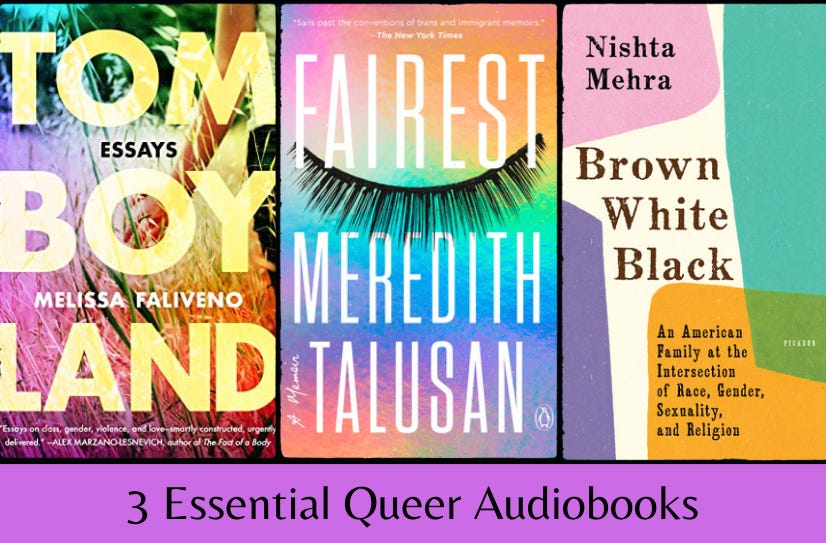
Tomboyland by Melissa Faliveno: Wonderful, clearsighted, vulnerable essays about queerness, gender identity, bi erasure, family making, the Midwest, sex, choosing not to have kids, place, desire. One of my favorite listens of 2020. I think about it all the time.
Fairest by Meredith Talusan: A memoir about the multiplicity of experiences that lives and bodies hold. Talusan, a Filipina trans woman with albinism, writes about immigrating to the US, passing for white during college, becoming a writer, and her own specific journey of gender discovery. Her narration is especially good; I had trouble hitting pause.
Brown White Black by Nishta J. Mehra: A book of questions, disguised as essays, about being an Indian American woman married to a white woman and raising a Black son. Mehra approaches everything in her life from so many angles, and she does a lot of grappling. I love this book for its openness and uncertainty. Every essay is an invitation to ongoing exploration.
The Bookshelf
The Library Shelf
Instead of the usual photo of my library shelf (it’s dwindling!), I wanted to share a few of the many, many queer books I’ve read this year thanks to the library. I buy books when I can, but there is no way I’d ever be able to afford my reading habit without the library!
A few standouts from my queer library reading thus far in 2021: I’m Afraid of Men by Vivek Shraya (book length essay about transmisogyny and so much more), Love After the End edited by Joshua Whitehead (speculative short stories by queer Indigenous writers), and A Two-Spirt Journey by Ma-Nee Chacaby (autobiography of a lesbian Ojibwa Cree elder).
The Visual
An unfortunate reality of Pride these days is watching corporations drape rainbows all over everything and pretend like they actually care about queer people, and not just money. I am obviously not here for that, but, let’s be honest: I am definitely here for rainbow book stacks that celebrate how much incredible queer lit there is in the world.
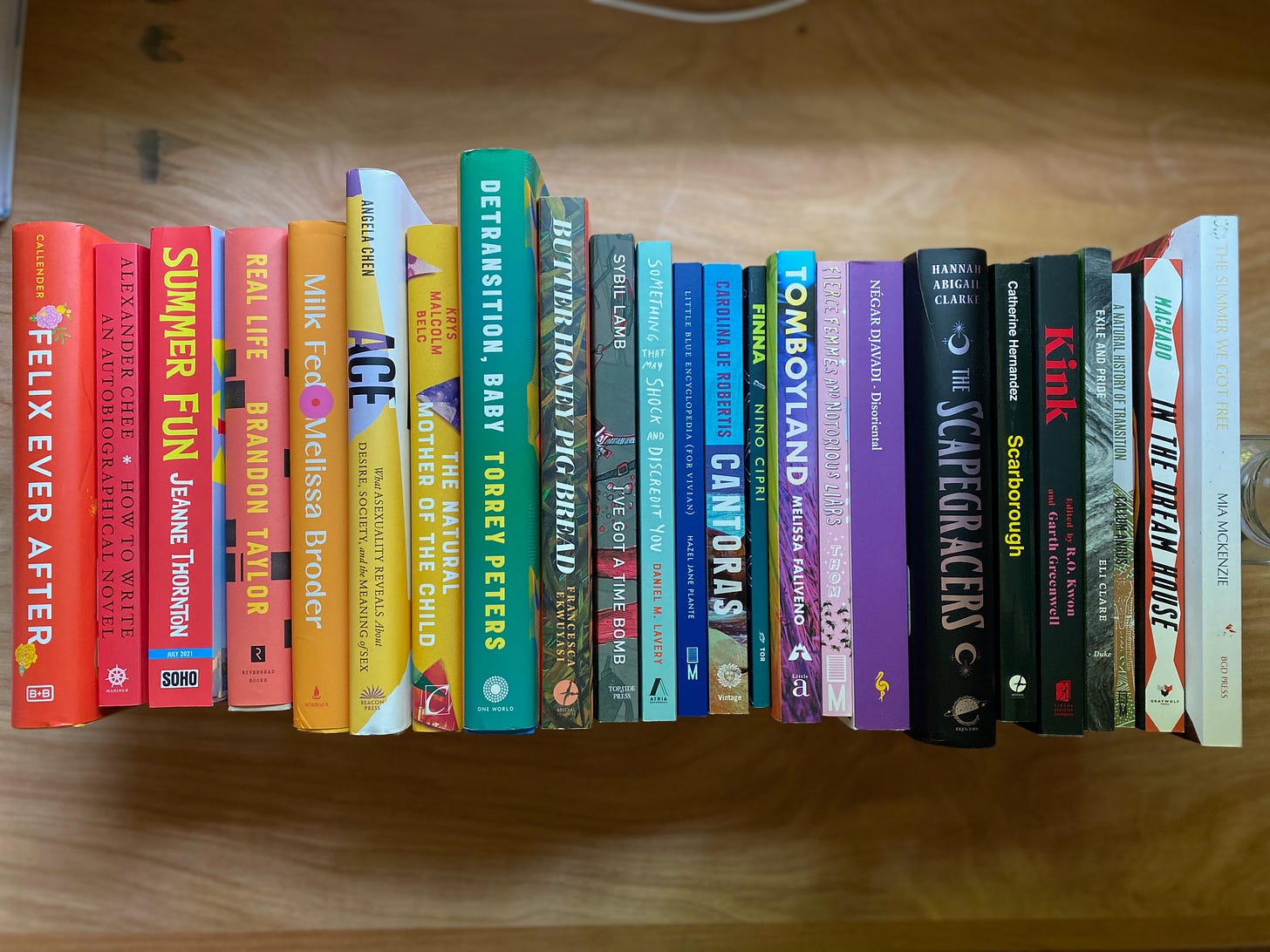
Now Out
Horray! With Teeth by Kristen Arnett is now out! Go forth and find yourself a copy.
Around the Internet
On Book Riot, I made a list of 20 must-read queer books out in June. If you’re making a Pride reading list, you could easily fill it up with titles form this list alone!
My review of Stone Fruit by Lee Lai is up at the Chicago Review of Books. I wrote about the sacredness of queer aunthood and how magical it is to see that experience depicted on the page.
The Boost
For those of you who are new, this section is basically a repository for stuff I’m thinking about and want to share, often but not always relating to the newsletter theme. This week: celebrate Pride by supporting queer-owned businesses and queer artists! This is something I do year-round, but it never hurts to show queer businesses a little extra love in June. Here are a few of my favorites:
Loyalty Bookstore: A Black, queer owned bookshop with locations in DC and Maryland. This is currently where my Bookshop.org money goes. Their list of BIPOC books to pre-order is quite handy, and they also have a subscription box featuring books by queer, disabled and BIPOC writers that looks awesome. One day I will actually visit this shop in person!
Sis Got Tea: I actually just discovered this Black, queer owned tea shop based in Louisville. I am a daily tea drinker and I’m always on the lookout for new teas. I’m super excited to try some of their blends, which sound amazing.
Molly Costello Art & Design: I love Molly’s work so much, and I appreciate their transparency and commitment to social justice and abolition. Their Etsy shop is on a break till mid-June, but I promise it’ll be worth the wait.
Image: An Instagram post by Molly Costello, description quoted from the caption: “An illustration of a dandelion with 2 yellow flowers and one white seeds head grows out of black soil. It is surrounded by and connected to purple mushrooms with constellations as roots. Small people surround the plant and reach out toward each other. Seeds float into the sky and white letters read ‘Crisis expands our imaginations around what is possible.’”
As always, a little bit of beauty to send you on your way: I thought about closing out this newsletter with some specifically queer joy and/or beauty. But my queer self is happiest in wide open spaces under heavy grey skies, so I decided to honor that instead.
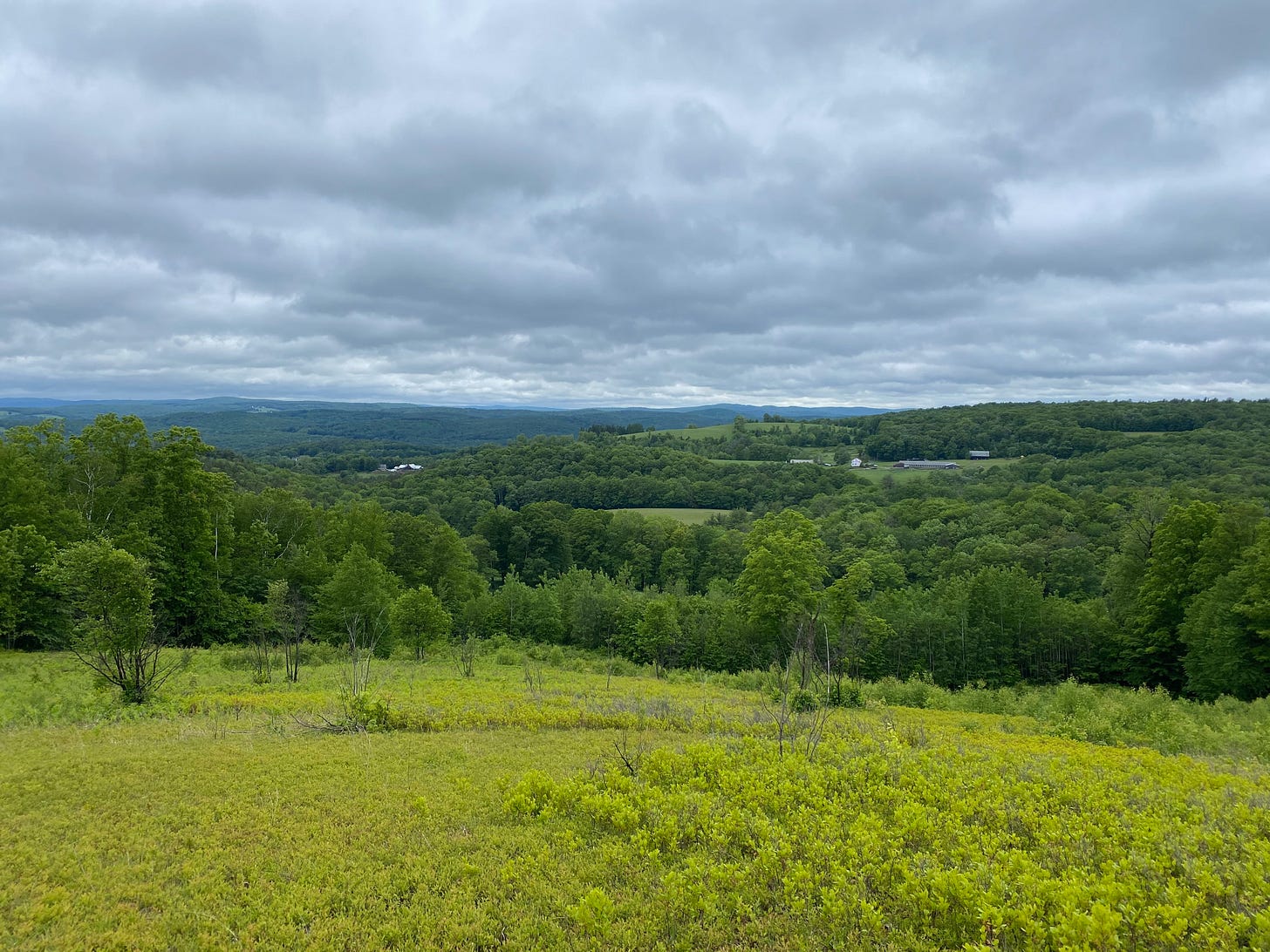
Finally, if you’re a queer reader of this newsletter, and you’d like a postcard in the mail this month, I’d love to send you one! Just reply with your address (or the address of anyone in your life who could use a little queer joy in their mailbox).
And that’s it until next week. Catch you then!





